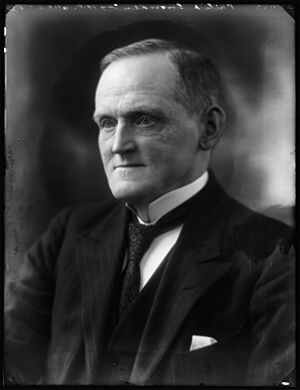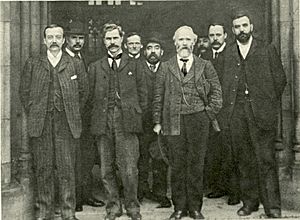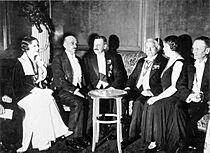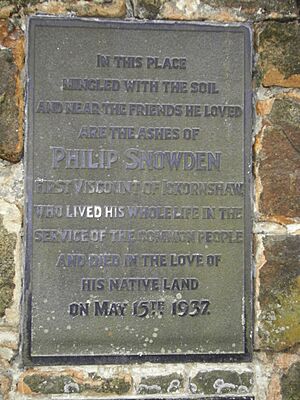Philip Snowden, 1st Viscount Snowden facts for kids
Quick facts for kids
The Viscount Snowden
|
|
|---|---|

Snowden in 1923
|
|
| Chancellor of the Exchequer | |
| In office 7 June 1929 – 5 November 1931 |
|
| Prime Minister | Ramsay MacDonald |
| Preceded by | Winston Churchill |
| Succeeded by | Neville Chamberlain |
| In office 22 January 1924 – 3 November 1924 |
|
| Prime Minister | Ramsay MacDonald |
| Preceded by | Neville Chamberlain |
| Succeeded by | Winston Churchill |
| Member of Parliament for Colne Valley |
|
| In office 15 November 1922 – 27 October 1931 |
|
| Preceded by | Frederick Mallalieu |
| Succeeded by | Lance Mallalieu |
| Member of Parliament for Blackburn |
|
| In office 8 February 1906 – 14 December 1918 |
|
| Preceded by | Sir William Coddington |
| Succeeded by | Percy Dean |
| Personal details | |
| Born | 18 July 1864 Cowling, West Riding of Yorkshire, England |
| Died | 15 May 1937 (aged 72) Tilford, Surrey, England |
| Political party | Liberal (until c. 1894) Labour (c. 1894–1931) National Labour (1931–1932) None (1932–1937) |
| Spouse | |
Philip Snowden, 1st Viscount Snowden (18 July 1864 – 15 May 1937) was an important British politician. He was known for being a powerful speaker. He became very popular among workers and trade unions because he spoke out against capitalism (an economic system where private businesses own most things). He promised a better society based on socialism (an economic system where the community or government owns and controls the means of production).
Snowden was the first person from the Labour Party to become Chancellor of the Exchequer. This job is like being the country's main finance minister. He held this role twice: first in 1924, and then again from 1929 to 1931. In 1931, he disagreed with the Labour Party's plans and was removed from the party. He supported a different group called the National Government.
Contents
Early Life and Political Beginnings: 1864–1906
Philip Snowden was born on July 18, 1864, in a place called Cowling in Yorkshire, England. His father, John Snowden, was a weaver and believed in political movements like Chartism. Philip grew up in a family that believed in making big changes to society. He later wrote that he learned his political ideas from his family.
Even though his parents and sisters worked in weaving, Philip did not join them. He went to a local school and then became a pupil-teacher. When he was 15, he started working as an insurance clerk. He studied hard and passed a special exam, which led him to a government job at the Excise Office in Liverpool in 1886. He then worked in different places across Scotland and Devon.
In 1891, when he was 27, Snowden had a serious cycling accident in Devon. He hurt his back and could not move his legs. For two years, he learned to walk again using sticks. Because of his injury, he decided to leave his government job. While he was getting better at his mother's house, he started to read and learn about socialist ideas.
Snowden first joined the Liberal Party. In 1893, he was asked to give a speech about the dangers of socialism for a local Liberal club. But as he researched the topic, he became convinced that socialism was a good idea instead! He then joined the Independent Labour Party (ILP) in 1899 and led it from 1903 to 1906.
He became a well-known speaker for the ILP. He wrote a popular booklet called The Christ that is to Be in 1903. He used strong words and facts to show how bad conditions were under capitalism. He compared this to a perfect future society under socialism. He called some local business leaders "bloodsuckers and parasites." By 1906, he was elected as a MP for Blackburn. He was a famous socialist leader alongside people like Keir Hardie and Ramsay MacDonald.
In 1905, Snowden married Ethel Annakin, who was a strong supporter of women's suffrage (the right for women to vote). Philip supported his wife's beliefs and often spoke at meetings for women's rights.
A Member of Parliament: 1906–1924
In 1906, Philip Snowden became a Labour MP for Blackburn. He kept writing and giving speeches. He pushed for more radical changes than the government was making at the time. He even created his own "Socialist budget" to compete with the government's budget plan.
When World War I started in August 1914, Snowden was on a lecture tour in Australia. He returned to Britain in February 1915. He was not against all wars, but he did not support recruiting people for the army. He also spoke out against forcing people to join the military. Many people did not like his views, and he lost his seat in the 1918 election. However, in 1922, he was elected again to represent Colne Valley.
Chancellor of the Exchequer: 1924
In January 1924, Ramsay MacDonald became Prime Minister. He chose Philip Snowden to be the first ever Chancellor of the Exchequer from the Labour Party. This was a very important job.
Even though Snowden was a socialist, he believed that Britain's economy needed to get better after World War I. He thought this was important before the country could move towards a socialist society. So, he cut taxes and trade fees to help balance the country's budget. He also wanted Britain to return to the gold standard (a system where the value of money is directly linked to gold).
In his budget plan, Snowden lowered taxes on things like tea, coffee, and sugar. He also reduced spending on weapons and set aside money for council housing (affordable homes built by the government). He said that by lowering taxes on food for working-class people, his budget helped create a "free breakfast table." He strongly believed in having a balanced budget and not wasting any money. He understood that unemployment was a big problem. But he disagreed with the idea of the government spending more money than it had to fix it.
In Opposition and Return to Power: 1924–1931
Snowden led the ILP again from 1917 to 1920. But in 1927, he left the party. He felt that the ILP was moving away from his idea of "evolutionary socialism" (slow, gradual changes) towards "revolutionary socialism" (fast, big changes). He also did not like new economic ideas that suggested governments should spend more money than they earn to help the economy.
In 1929, the Labour Party became the largest party in the general election. Snowden was again made Chancellor of the Exchequer. His economic ideas were more like traditional Liberalism than socialism. He believed that borrowing money was bad and that free trade was essential for a strong economy.
He was against any big new economic plans to deal with the Great Depression. He stopped ideas to introduce protectionist tariffs (taxes on imported goods to protect local businesses). In 1930, he rejected a plan from other Labour ministers that suggested spending a lot of money on public projects to fight unemployment.
The government eventually fell apart because of arguments about the budget. Snowden agreed with cutting government spending, but many other ministers and trade unions refused to cut unemployment benefits.
Snowden kept his job as Chancellor in the National Government formed in 1931. Because of this, he was removed from the Labour Party, along with Ramsay MacDonald. In a radio speech in October 1931, he called Labour's policies "Bolshevism run mad." He said his own ideas were "sane and evolutionary Socialism." Snowden decided not to run for parliament in the November 1931 election. In that election, the Labour Party lost many of its seats. Around this time, Snowden had surgery, and his health got worse.
Some historians have criticized Snowden for sticking to his economic beliefs, like balanced budgets and the gold standard, even during the Great Depression. They argue that these ideas might have harmed the economy. However, other historians now see Snowden in a more positive light. They argue that the Labour government had very few options during that time. They also suggest that Britain handled its economy better than many other countries during the Great Depression.
Later Life and Legacy: 1931–1937
In 1931, Philip Snowden was given the title of Viscount Snowden. He served as Lord Privy Seal in the National Government from 1931 to 1932. He resigned from this role because he disagreed with new taxes on imported goods. He believed that free trade was still very important.
He later wrote his Autobiography, where he strongly criticized Ramsay MacDonald. In the 1935 election, Snowden supported a different economic plan, even though it was very different from his own past ideas. He said he was returning to his long-held economic views, but that these had been "temporarily inadvisable" during the crisis of 1931.
Lord Snowden died from a heart attack on May 15, 1937, at his home in Tilford, Surrey. He was 72 years old. After he was cremated, his ashes were scattered on Cowling Moor, near where he was born. His wife gave his collection of books to the Keighley Public Library. A stone monument was built in his memory in 1938.
His title of Viscount ended when he died because he had no children to pass it on to. Lady Snowden, his wife, died in 1951.
Images for kids
 | William L. Dawson |
 | W. E. B. Du Bois |
 | Harry Belafonte |





